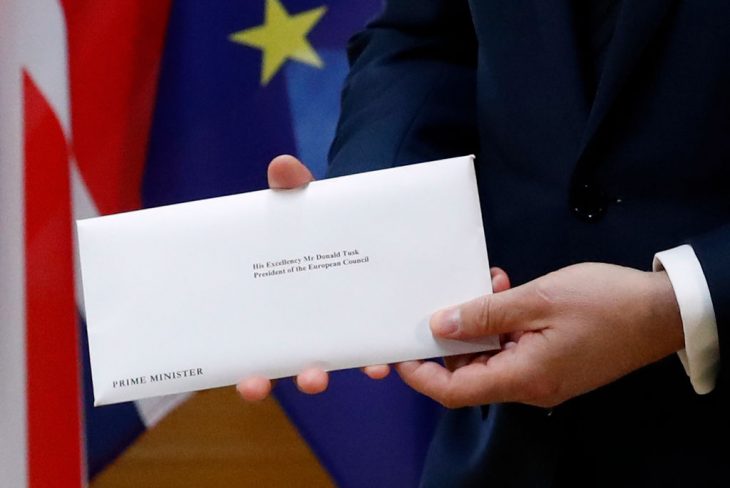We’re off! The two year countdown until Brexit has begun. Theresa May’s triggering of Article 50 has been met with unanimous praise in the press, with the newspaper editorials saying the PM hit all the right notes in her letter. But there was controversy too. Some are saying the inclusion of a message suggesting Britain’s co-operation on security matters is at stake is an unhelpful threat to Brussels. Here’s what the papers are saying about a historic day for Britain:
Theresa May’s Article 50 letter was ‘pitch-perfect’, says the Sun, which argues that the Prime Minister succeeded in balancing generosity with a ‘flash of steel’. The onus now, the paper says, is for the EU to follow in May’s footsteps. But ‘the early signs are not great’. Instead, Angela Merkel has already ‘rejected one key request’ – that ‘divorce’ talks happen at the same time as trade negotiations. Even if this early blip doesn’t set the tone for upcoming talks, though, we must remember that negotiations will certainly be ‘hard-nosed’. It’s vital that Britain plays ‘every decent card in our hand’ – and ‘security is one of the strongest’. But it’s not only those on the continent intent on causing trouble, warns the Sun. ‘The reaction on the opposition benches at such a historic moment in the Commons was pitiful,’ according to the paper. Whether it was ‘moronic barracking’ from MPs or ‘giggling’ from the Lib Dems – or the SNP ‘boring on’ – it was a ‘contemptible’ display all round. During yesterday’s Commons debate, ‘so few rose to the occasion’. But the Sun says thankfully ‘Mrs May did’.
The triggering of Article 50 was ‘necessarily cordial’, says the Daily Telegraph. And it was with ‘good sense’ that Theresa May opted not to ‘reciprocate the tone of ill-feeling emanating from across the Channel on Wednesday’. Mrs May, says the Telegraph, ‘has a clear plan’; ensuring she is as ‘charming and emollient as necessary’ is vital for putting it into place. After all, at this stage of negotiations, ‘respect and cordiality’ are vital qualities. But don’t be fooled: it might not always be like this. In the talks ahead, a flash of steel will be needed ‘to ensure that this country gets the best deal it possibly can’. So far, we’ve seen the ‘carefully choreographed’ elements of Britain’s departure from the EU. Soon, the Telegraph says, the ‘hard work’ will start ‘behind closed doors’. And it’s then that ‘we must be ready…to take the gloves off’.
The European Union’s reaction to the triggering of Article 50 was notable for its ‘depressing predictability’, says the Daily Mail. While the PM was a ‘model of reason and conciliation’, the ‘childish bombast, posturing and petulance’ was immediately on show across the Channel. But for all the bluster being spoken in Brussels – and the early intervention made by Merkel – the PM and her ministers must ‘hold their nerve’. Our strongest card, says the Mail, is the fact that we buy more from Europe than vice versa. This makes it clear that ‘they need us more than we need them’, the paper argues.
Theresa May ‘made a promising start with her letter to Mr Tusk’, says the Times, which argues that the Prime Minister took the ‘right approach’. The paper also says her ‘spirit of conciliation’ will be vital in the months and years ahead. Yet ‘Mrs May’s letter also contains signs that Britain is ready to be robust when necessary’, argues the Times. The Times focuses on what is being interpreted by some as an implicit threat: that Britain’s co-operation on security matters is at stake. ‘To play this card so early in the Brexit negotiation is high-risk, but it was shrewdly paired with a more emollient tone elsewhere,’ says the Times. One thing is vital to remember, though: when David Cameron, in the run-up to the referendum, tried to negotiate with Brussels, ‘he was too quick to compromise’. The PM must ‘not make the same mistake, warns the Times.
Brexit is a ‘is a historic and needless act of political folly’, says the Guardian, which mourns Britain’s departure from the European Union. During her statement to MPs, it was obvious that the PM had ‘weighed her words carefully’. However, in Europe, her message did not go down so well. Her suggestion that there ’could be a trade-off between Britain’s security responsibilities with its desire for economic gain’ was interpreted as a ‘modern day form of gunboat diplomacy’, the paper warns. This ‘remains her strongest – and weakest – argument’, says the Guardian, which says that this form of argument is a ‘revealing error’ on the PM’s part. ‘Rabid Brexiters in the press and in her own party’ have been May’s main audience so far. But ‘now her critics are the people Mrs May has to do business with abroad,’ says the Guardian. And this worrying blip ‘shows that Mrs May understands her domestic audience but not her European interlocutors,’ the paper argues.







Comments